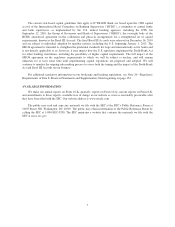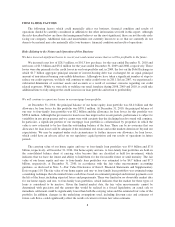eTrade 2010 Annual Report Download - page 20
Download and view the complete annual report
Please find page 20 of the 2010 eTrade annual report below. You can navigate through the pages in the report by either clicking on the pages listed below, or by using the keyword search tool below to find specific information within the annual report.As a result of the covenants and restrictions contained in the indentures, we are limited in how we conduct
our business and we may be unable to raise additional debt or equity financing to compete effectively or to take
advantage of new business opportunities. Each of these series of our corporate debt contains a limitation, subject
to important exceptions, on our ability to incur additional debt if our Consolidated Fixed Charge Coverage Ratio
(as defined in the relevant indentures) is less than or equal to 2.50 to 1.0. As of December 31, 2010, our
Consolidated Fixed Charge Coverage Ratio was 0.95 to 1.0. The terms of any future indebtedness could include
more restrictive covenants.
Although these covenants provide substantial flexibility, for example the ability to incur “refinancing
indebtedness” and to incur up to $300 million of secured debt under a credit facility, the covenants, among other
things, generally limit our ability to incur additional debt even if we were to substantially reduce our existing
debt through debt exchange transactions. We could be forced to repay immediately all our outstanding debt
securities at their full principal amount if we were to breach these covenants and did not cure the breach within
the cure periods (if any) specified in the respective indentures. Further, if we experience a change of control, as
defined in the indentures, we could be required to offer to purchase our debt securities at 101% of their principal
amount. Under our debt securities a “change of control” would occur if, among other things, a person became the
beneficial owner of more than 50% of the total voting power of our voting stock which, with respect to the 2011
Notes, 2013 Notes and 2015 Notes, would need to be coupled with a ratings downgrade before we would be
required to offer to purchase those securities.
We cannot assure that we will be able to remain in compliance with these covenants in the future and, if we
fail to do so, that we will be able to obtain waivers from the appropriate parties and/or amend the covenants.
The value of our common stock may be diluted if we need additional funds in the future or engage in
debt-for-equity exchanges in the future.
In the future, we may need to raise additional funds via debt and/or equity instruments, which may not be
available on favorable terms, if available at all. If adequate funds are not available on acceptable terms, we may
be unable to fund our capital needs and our plans for the growth of our business. In addition, if funds are
available, the issuance of equity securities could significantly dilute the value of our shares of our common stock
and cause the market price of our common stock to fall. We have the ability to issue a significant number of
shares of stock in future transactions, which would substantially dilute existing shareholders, without seeking
further shareholder approval.
In recent periods, the global financial markets were in turmoil and the equity and credit markets experienced
extreme volatility, which caused already weak economic conditions to worsen. Continued turmoil in the global
financial markets could further restrict our access to the equity and debt markets.
Citadel is our largest shareholder and debtholder, with approximately 9.9% of our common stock or
approximately 27% of our common stock assuming conversion of convertible debentures held by
Citadel. Accordingly, Citadel’s interests may conflict with the interests of other shareholders.
Citadel is the largest holder of our common stock, and based upon our review of publicly available
information, we believe Citadel owns approximately 9.9% of our outstanding common stock or approximately
27% of our common stock assuming conversion of convertible debentures held by Citadel. Although Citadel is
not required to disclose to us the amount of our outstanding debt securities it owns, we believe it owns in the
aggregate approximately $590 million of the non-interest-bearing convertible debentures. In addition, Kenneth
Griffin, President and CEO of Citadel, joined the Board of Directors on June 8, 2009 pursuant to a director
nomination right granted to Citadel in 2007.
Citadel is an independent entity with its own investors and is entitled to act in its own economic interest
with respect to its equity and debt investments in E*TRADE. As discussed below, our debt securities contain
restrictive covenants. In pursuing its economic interests, Citadel may make decisions with respect to fundamental
corporate transactions which may be different than the decisions of investors who own only common shares.
17
























